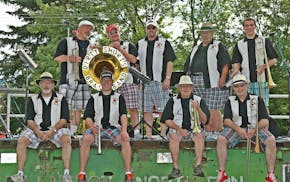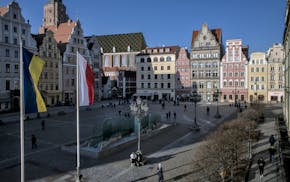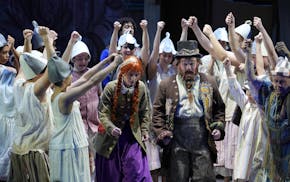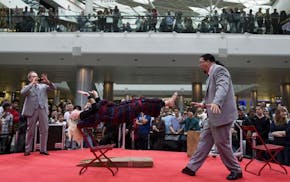
"Group Living and Other Recipes," Lola Milholland's unusual memoir-with-recipes is a delight to read, her descriptions full of flavor and spice, more umami than bitter, a little salty and never too sweet.
The author states in her prologue that she originally set out to write a commune cookbook, but the book that resulted, "Group Living," is much more literary. She's chosen to write in short story-like chapters about her various families and chosen communities while engaging with the anti-capitalist philosophies that inspired them. Plus recipes!
Milholland lives communally with her partner, brother, and several friends in her childhood home in Portland, Ore., called the Holman House, a space she inherited from her hippie parents. Her parents never married each other and experimented with various forms of intentional communities when Milholland was growing up in the 1990s and early aughts.
Milholland vividly describes a childhood when Holman House was visited by friends, extended family, her mother's lover George, and even a group of three Tibetan monks, who were given her bedroom for a time when she was in second grade. As she recalls, "My parents had an unspoken philosophy about the house: We only deserve it if we share it."
Although her parents eventually split up, she writes about their time together with tenderness and intelligence: "I was raised by someone who'd disavowed Catholicism, patriarchy, and patriotism, in a household with a quality of transience and openness that felt transgressive. Guests were constantly coming and going, sometimes staying for weeks or months at a time. I loved it."
This love shines through Milholland's portraits of the people she has encountered throughout her life. She is particularly adept at showing a character in a few swift strokes.
For example, she describes her mother's way of walking "with punchy pitter-patter steps like a hummingbird in human disguise." Her aunt Nancy, once a "fearsome woman, a fire-and-brimstone hippie," is detailed in her later years: "Her eyes are quick and expressive, her muscles sinewy, and her shoulder-length hair a wolfish silvery-gray." Her grandfather Del was a carpenter, with large hands, and she recalled as a child that his fingers seemed like "five little arms attached to a palm."
Currently, Milholland runs an organic noodle business, Umi Organic, that also is committed to providing nutritious school lunches. A graduate of Amherst College, she has published short works in various magazines, including Gastronomica. "Group Living" is her first book.
Milholland's life is full of rich material, but the memoir is more than a series of anecdotes about the very interesting characters in her life. She's also serious about exploring the ideas behind communal living. In later chapters, Milholland visits with other communities where friends and relatives have made their homes, exploring their varied philosophical underpinnings.
As Milholland points out, "Most people in the world live in communal settings." She sees embracing communal living in the U.S. as a means to address the current housing crisis and the dilemma of unpaid domestic labor usually relegated to women, and as a way out of "the racist, classist roots of the nuclear family and single-family home."
All in all, "Group Living and Other Recipes" is a generous book that gives the reader a lot to chew on.
May-lee Chai wrote the short story collections "Tomorrow in Shanghai" and "Useful Phrases for Immigrants," and is on the board of the National Book Critics Circle.
Group Living and Other Recipes
By: Lola Milholland.
Publisher: Spiegel & Grau, 320 pages, $28.

Free egg hunts for adults, concerts and other no-cost Twin Cities events to check out

Critics' picks: The 15 best things to do and see in the Twin Cities this week

Travel Troubleshooter: Booking.com won't refund room after on-time cancellation

'Frozen' fulfills magical ice princess dreams at the Children's Theatre Company



